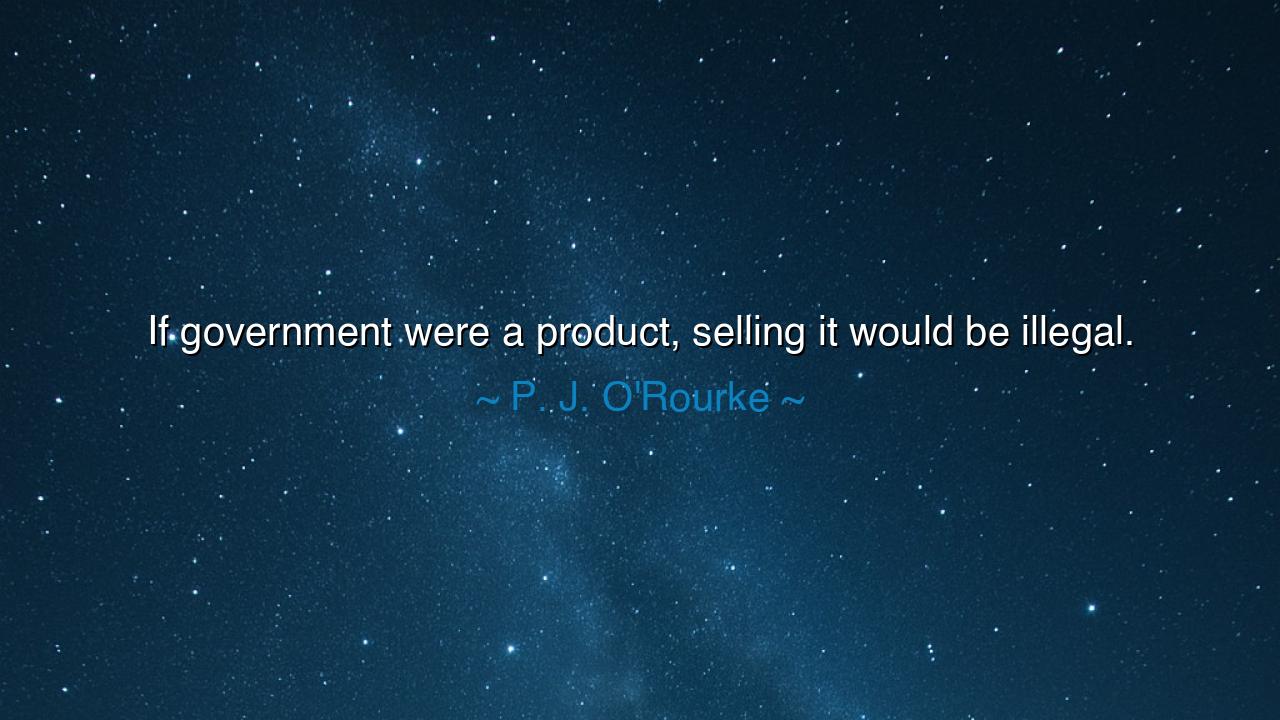
If government were a product, selling it would be illegal.






"If government were a product, selling it would be illegal." Thus spoke P. J. O’Rourke, the sharp-tongued satirist and philosopher of American humor, whose laughter was never mere jest, but the voice of reason wearing the mask of ridicule. In these few words, he cast a mirror before the face of modern politics — a mirror that reflects not nobility, but folly. His jest strikes like lightning: bright, brief, and scorching in its truth. For if the government, with all its inefficiency, waste, and corruption, were measured by the same standard as the goods it regulates, it would not survive a single day on the open market. O’Rourke’s humor hides a sermon, and his laughter conceals a lament: that the very institution meant to serve the people too often serves itself.
To understand this quote, one must know the spirit of the man who spoke it. P. J. O’Rourke was no mere comedian; he was a philosopher of liberty disguised as a jester. He lived through the late twentieth century — an age swollen with bureaucracy, taxes, and empty promises. He had seen governments around the world proclaim their wisdom and benevolence, while plunging their nations into debt, inefficiency, and deceit. Through his wit, he declared a simple truth: that if government were subject to the same scrutiny as business — if it were forced to produce results, honor contracts, and satisfy its customers — it would be exposed for what it often becomes: a monopoly of incompetence that thrives not on success, but on compulsion.
The meaning of O’Rourke’s words is not hatred of government, but distrust of power unaccountable to reason. In the marketplace, a product must prove its worth. A farmer must sell good fruit, a builder must raise strong walls, a merchant must keep his word. If they fail, they lose their customers, their wealth, their livelihood. But a government, when it fails, demands more money. When its policies collapse, it blames others. When its systems falter, it expands them further. It is the only enterprise in the world that grows stronger through failure, for it feeds not on excellence, but on authority. And O’Rourke’s quip pierces this paradox: if such behavior were found in any business, the law itself would call it fraud.
History offers countless examples of this truth. Consider the Soviet Union, a government that claimed to feed, clothe, and uplift its people — yet delivered hunger, poverty, and fear. Its factories produced mountains of goods that no one wanted, its bureaucrats silenced every complaint, and its leaders praised themselves while their citizens starved. Were it a business, it would have gone bankrupt in its first decade; but as a government, it endured for seventy years, sustained not by success, but by force. The irony of O’Rourke’s words resounds through such histories — for governments, unlike merchants, are not judged by the satisfaction of their people, but by the endurance of their power.
Yet O’Rourke’s humor, though biting, is not a cry for anarchy. He does not call for the destruction of government, but for its humility. His jest reminds us that power must be limited by accountability — that the state must never forget it is a servant, not a master. For when the people become its subjects rather than its customers, it ceases to be a government and becomes a racket. A good government, like a good product, must be measured by what it gives, not by what it takes. It must offer safety without tyranny, justice without arrogance, and order without suffocation. When it fails in these things, it has betrayed its purpose — and no laughter can conceal the shame.
O’Rourke’s quote also reflects the deeper wisdom of classical liberty — the ancient belief that man’s freedom is his greatest wealth. From the philosophers of Greece to the founders of America, the same truth has been sung: that government is a necessary evil, not a moral good; that it exists to restrain vice, not to command virtue; to secure property, not to own it. When government grows beyond these bounds, it becomes what O’Rourke mocked — a bad product, one that would be illegal to sell if justice were blind to title or power. It is the duty of free people, then, to inspect their government as they would a purchase — to demand quality, reject false promises, and refuse to pay for what does not work.
The lesson of O’Rourke’s wit is one of vigilance. Do not worship government as a god, nor despise it as a devil, but judge it as a tool — and discard it when it fails. Do not measure its virtue by its size, but by its service. Hold your leaders to the same standard you hold a craftsman, a farmer, or a merchant: deliver what you promise, or step aside. And do not be fooled by grandeur, slogans, or parties; for as long as governments are made of men, they will share in men’s flaws. Only the eyes of a watchful people can keep them honest.
So remember the wisdom of P. J. O’Rourke, wrapped in laughter but edged with truth: “If government were a product, selling it would be illegal.” His jest is a mirror, held before every citizen and every ruler. It invites us to laugh, yes — but also to think, to act, to demand better. For the laughter of the free is the first sound of reform, and the day we cease to question our government is the day it truly becomes a crime to sell. Let us, then, keep our humor sharp and our hearts awake, for the price of liberty, like any good product, must be paid — not in money, but in vigilance and courage.






AAdministratorAdministrator
Welcome, honored guests. Please leave a comment, we will respond soon